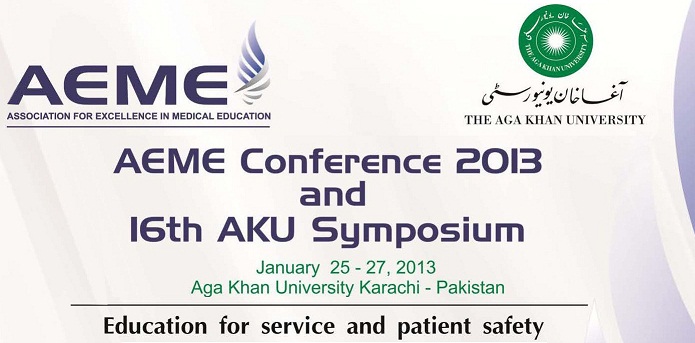Day 1 : Oral Presentations (Theme: Evaluation & Quality Assurance)
Evaluating the effectiveness of a postgraduate course in internal medicine using Kirkpatrick Model; experience at a university hospital in Karachi
Location
Lecture Hall 1
Start Date
26-1-2013 4:30 PM
Abstract
Background: Evaluation is one of the essential elements of the educational process. For any training program there should be a continuous cycle of analysis of training program, identifying any factors affecting any deficiencies in performance, developing and implementing strategies to address the identified challenges and assess the improvement brought about by the strategies. Section of Internal Medicine, Department of Medicine (DoM) at the Aga Khan University (AKU) regularly inducts around 12-14 residents on an annual basis. The candidates are heavily involved in patient care towards the end of their residency program and are at the same time appearing in the examinations conducted by College of Physicians and Surgeons Pakistan (CPSP) which are deemed mandatory. DoM conducted comprehensive course for the senior residents of Internal Medicine residency program in order to fine tune their cognitive, affective and psychomotor skills before they appear in the examinations which was found very much needed. Objective of the study To evaluate the effectiveness of a postgraduate course in internal medicine.
Methods: The study was based on Kirkpatrick Model of Evaluation. A questionnaire was developed based on literature review regarding the candidates and faculty expectations of the course, their objectives and their view on different aspect of the course. Intervention comprised of extensive course of two components, theory and clinical course, each component comprising of two weeks duration. Questionnaire was administered pre and post course followed by focus group discussions to further explore their opinions and expectations. A follow up of the study was done looking into the number of candidates who took the CPSP examination and went through it successfully.
Results: Results of analysis of the quantitative data showed that the questionnaire had a high reliability (α=0.96). Despite the limitation of a small sample size, there was statistically significant difference between pre and post self-perception of the cohort, on their ability to demonstrate appropriate evaluation of patients (p= 0.015), and in counseling and educating patients (p=0.033).However the results of the mock exam was suboptimal as the pass percentage was kept high to highlight the deficiencies in formative feedback. Fifty percent of the candidates from AKU, who did the course cleared FCPS exam in contrast to overall 7% pass rate in the region.
Conclusions: Residents who completed the course showed an increase their
knowledge with moderate retention of information. Most residents believe that the course is important, and requested such courses as more often. The clinical environment provided helped the residents in enhancing their clinical competence (medical knowledge, clinical skills and professional attitude) and gave an avenue to develop illness scripts into their minds.
Key words: FCPS, MRCP, Postgraduate, Internal Medicine
Evaluating the effectiveness of a postgraduate course in internal medicine using Kirkpatrick Model; experience at a university hospital in Karachi
Lecture Hall 1
Background: Evaluation is one of the essential elements of the educational process. For any training program there should be a continuous cycle of analysis of training program, identifying any factors affecting any deficiencies in performance, developing and implementing strategies to address the identified challenges and assess the improvement brought about by the strategies. Section of Internal Medicine, Department of Medicine (DoM) at the Aga Khan University (AKU) regularly inducts around 12-14 residents on an annual basis. The candidates are heavily involved in patient care towards the end of their residency program and are at the same time appearing in the examinations conducted by College of Physicians and Surgeons Pakistan (CPSP) which are deemed mandatory. DoM conducted comprehensive course for the senior residents of Internal Medicine residency program in order to fine tune their cognitive, affective and psychomotor skills before they appear in the examinations which was found very much needed. Objective of the study To evaluate the effectiveness of a postgraduate course in internal medicine.
Methods: The study was based on Kirkpatrick Model of Evaluation. A questionnaire was developed based on literature review regarding the candidates and faculty expectations of the course, their objectives and their view on different aspect of the course. Intervention comprised of extensive course of two components, theory and clinical course, each component comprising of two weeks duration. Questionnaire was administered pre and post course followed by focus group discussions to further explore their opinions and expectations. A follow up of the study was done looking into the number of candidates who took the CPSP examination and went through it successfully.
Results: Results of analysis of the quantitative data showed that the questionnaire had a high reliability (α=0.96). Despite the limitation of a small sample size, there was statistically significant difference between pre and post self-perception of the cohort, on their ability to demonstrate appropriate evaluation of patients (p= 0.015), and in counseling and educating patients (p=0.033).However the results of the mock exam was suboptimal as the pass percentage was kept high to highlight the deficiencies in formative feedback. Fifty percent of the candidates from AKU, who did the course cleared FCPS exam in contrast to overall 7% pass rate in the region.
Conclusions: Residents who completed the course showed an increase their
knowledge with moderate retention of information. Most residents believe that the course is important, and requested such courses as more often. The clinical environment provided helped the residents in enhancing their clinical competence (medical knowledge, clinical skills and professional attitude) and gave an avenue to develop illness scripts into their minds.
Key words: FCPS, MRCP, Postgraduate, Internal Medicine

